|
Note: this is the third article in a short series designed to help you play your guitar more often, because the more you play your guitar, the better you'll get! If you haven't already, check out part 1 and part 2. 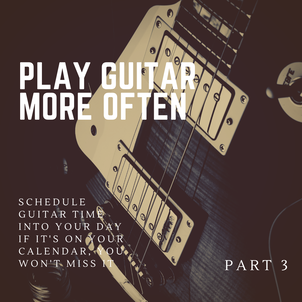 The more you play your guitar, the better you will get. So far in this series we've looked at keeping your guitar on a stand, and building a habit around something else you do on a daily basis. While both of these are great strategies, it's worth developing a wider toolkit for getting your guitar practice in. I've found over the years that it sometimes takes a variety of tools to keep yourself moving forward. Habits may work for a while, but then your schedule changes. You keep the guitar on a stand in your living room, but now it's summer and you're spending your time outside. Whenever one strategy stops helping you play more, you can always change your approach - if you have more than one trick up your sleeve. This lesson will focus on scheduling guitar practice into your day. It can be as simple as a reminder on your phone, or an entry into your calendar app. Just something to give you a little nudge to pick up your guitar.
0 Comments
Note: this is the second article in a short series designed to help you play your guitar more often, because the more you play your guitar, the better you'll get! Check out part 1 here. 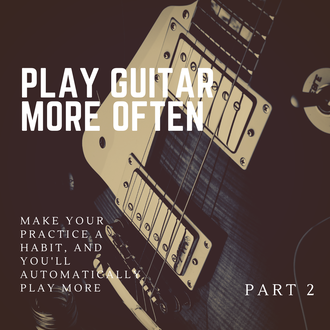 If you want to improve your guitar playing, you need to spend time playing guitar. It seems obvious, but sometimes we need to have these things spelled out for us. In part one of this series, we looked at making your guitar visible so you'll be more likely to pick up your guitar and play it. In this lesson, we are going to explore creating a habit of playing your guitar more often. It takes a little bit of thought and willpower up front, but before too long you'll be picking up and playing your guitar almost automatically each day.  The best guitar players I've met are the ones who play guitar the most. This goes for the professionals I've worked with, and students of mine who have become great players themselves. You don't have to practice for hours at a time to get good at playing guitar. It does help if you play your guitar regularly though. Even a few minutes a day can help you start to improve if you do it often enough. Note: If you want to become a professional, you have to put in the time. There's no way around that - in college, music majors are expected to practice a minimum of 4 hours each day. If you're playing for fun, you'll be surprised at how much you can improve with a little bit of time each day. The biggest hurdle you face in your own guitar playing is making sure you're playing your guitar regularly. Playing for an hour a couple of days out of the week is not going to help you as much as playing guitar for a little bit of time each day. Make it a goal to play guitar on more days than you don't play guitar. (Even if it's just for a couple of minutes - it's worth it) Over the next few weeks, we'll look at some simple ways you can start playing your guitar more regularly. Click the "Read More" button below. 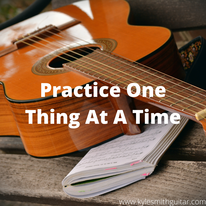 Like anything worth doing, learning to play guitar takes time. Whether you’re in guitar lessons or learning on your own, there is no such thing as a shortcut. But this should be seen as good news! Playing guitar is a lot of fun even at the beginning stages. If you enjoy the process, there is no need to try to speed things up. That being said, it can be tempting to look around and decide that you are somehow behind. Whether you’re looking at friends who have been playing longer than you, or watching the 9 year old shredding the blues on youtube, there is always something out there to make us want to take our playing further. One mistake I see is when people try to “catch up” by working on several things at once and trying to multitask in their guitar practice. The idea that you can just do more and speed up your progress is tempting to buy into - but unless you have several hours a day to practice (and the attention span/stamina to match), it just doesn’t work out that way. The best way for you to make progress in your guitar playing is to be patient, and work on one thing at a time. 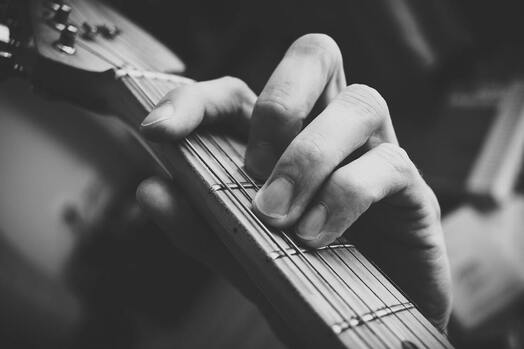 Consistent practice (picking up the guitar most days) is your fastest path to improving your guitar playing. While this may sound like a no-brainer, many guitar players and students I come across don’t follow this simple idea. It’s easy to let life get in the way, especially when you have a busy schedule and don’t feel like you have time to practice. When you let too many days go by between practice sessions, you’ll start to get rusty - even if you practice for long sessions on days that you do play your guitar. This is typical even with more serious students at the college level. They will tend to practice a lot just before an impending deadline - whether it’s a lesson day, or a performance - and then put the guitar down for a couple of days until the next deadline pops up. With a little effort you can build a habit of playing your guitar on more days than you don’t - and keep your guitar skills moving in the right direction. The more often you pick up your guitar to practice, the faster you’ll improve (and it will be much less stressful to get ready for your big performances)! Listening to great guitarists is an essential part of learning to play guitar. Hearing great players will give you ideas, inspiration, and help you develop your own unique sound. Below you'll find a list of some of my favorite guitar players in a variety of styles, with links to recordings of their playing. This list will get updated regularly, so check back often. If there's a guitarist that isn't on this list that you think should be or any of the links don't work for you, contact me and let me know! Jazz GuitarBlues GuitarRock GuitarWhen it comes to playing guitar, you are what you listen to. So keep listening to great guitar players of any style you like.
Keep checking back to see what's new on the list, and feel free to contact me to let me know what you're listening to! Getting A Good Sound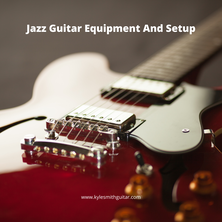 Getting a good sound for jazz on guitar is a combination of your equipment, settings on your electronics, and you as the player. If you want to sound good playing jazz, you need to listen to great jazz guitar players. Spend some time figuring out what you can do to match the sound of guitarists like Barney Kessel, Wes Montgomery, Joe Pass, and Jim Hall for starters. Your equipment also plays a part in the sound you create with it. Having the right strings and picks, the guitar and amplifier you use, and knowing how to adjust your tone and volume settings can all make a big difference.  When you think about observation you might picture Sherlock Holmes solving a mystery. Mr Holmes was famous for his observation skills that helped him solve crimes that were considered unsolvable. Anyone can develop the skill of observation, and it can help you whether or not you are trying to be a famous detective. Developing your own observation skills can help you become a better guitar player and get more out of your practice time, guitar lessons, and classes. Many guitar players get stuck in a rut simply because they are not paying attention to what they are doing. Your mind probably wanders a little as you practice your guitar, as you listen to your teacher explain something, or even as you read this sentence. By improving your observation skills you can get more out of your guitar lessons, your practice time, and you can even learn new things faster. In this lesson you will learn what observation is, how it can help your guitar playing, and some practical steps you can take towards developing your own powers of observation. 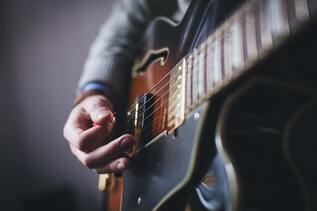 My recent relocation to Portland, OR has brought with it some changes, and some new opportunities. While it has been fun exploring our new town over the last month, there is a new teaching opportunity I am particularly excited about. I am happy to say that I will be joining the faculty of Mt Hood Community College this fall as a guitar instructor. I will be giving private guitar lessons to some of the MHCC guitar students on campus in Gresham, OR. I am really looking forward to working with community college students again. My first professional teaching job was at Spokane Falls Community College in Spokane, WA - where I was hired after earning my masters degree in jazz pedagogy. 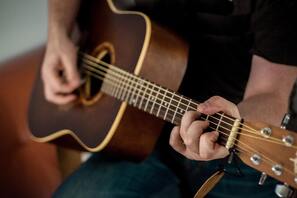 One of the great things about living in Portland, OR is the ability to see live music. Sometimes these shows are things that you plan for, buy tickets, and make an event of it. Other times, you just get lucky and stumble upon something great that’s happening. This last weekend, I was lucky enough to stumble onto a performance with finger style blues guitarist Dorian Michael. |

